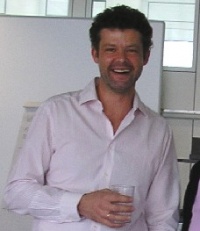Peter Gerjets: Difference between revisions
No edit summary |
No edit summary |
||
| Line 2: | Line 2: | ||
|name=Peter Gerjets | |name=Peter Gerjets | ||
<!-- Append to variable name the content "Rebecca Brubaker" --> | <!-- Append to variable name the content "Rebecca Brubaker" --> | ||
|image= | |image= PeterGerjets.jpg <!-- You can replace all the template's variables with the appropriate content--> | ||
|period= | |period=Collaborates periodically since 1995 | ||
|title= | |title= | ||
|projects= | |projects=[[Mental Attributes Profiling System]]<br>[[Dynamic Visualizations in Instruction]] | ||
|interests= | |interests= Learner control, cognitive load, adaptive user strategies, learning with dynamic visualizations, designing multimedia learning environments and supporting different learners' competences to use such environments | ||
|degrees=PD (Habilitation) | |degrees= Diploma in psychology 1991. Ph.D. (Dr. rer. nat.)1994<br>PD (Habilitation) 2002 | ||
|fields= | |fields= | ||
|universities= | |universities= University of Goettingen<br> University of Goettingen<br>Saarland University | ||
|specializations= | |specializations= | ||
|achievements= | |achievements= | ||
}} | }} | ||
Prof. Dr. Peter Gerjets | Prof. Dr. Peter Gerjets, Head of the Hypermedia Lab at the [[Knowledge Media Research Center]] has been collaborating with the [[Cyprus Neuroscience and Technology Institute since its foundation. He has visited the institute several times and collaborated in research projects, gave invited talks and co-authored papers. He served as Advisor to the [[New Media lab]], especially for the [[Mental Attributes Profiling System]] project. Prof. Gerjets has demonstrated a continuing a strong commitment to collaborate with Cyprus and mentors his Masters and PhD students while spending time in Cyprus. | ||
==Short bio== | |||
Peter received his PD (Habilitation) from the Saarland University in 2002 with a thesis on "Cognitive control in hypertext-based learning and problem solving: Goal management, strategy selection, and adaptive information utilization". In 1994 he received his Ph.D. (Dr. rer. nat.) from the University of Goettingen where he also received his diploma in psychology in 1991. Since 2002 he has been working as a principal research scientist at the Knowledge Media Research Center and beside as a full professor for research on learning and instruction at the University of Tuebingen. Before taking over his current position at the University of Tuebingen, Peter Gerjets had been working as Assistant Professor at the Saarland University in Saarbruecken. He was honored with the Young Scientist Award of the German Cognitive Science Society in 1999. From 1997 to 1998 Peter Gerjets was granted a postdoctoral scholarship of the DFG-Graduate College for Cognitive Science in Saarbruecken. From 1991 to 1995 he was a research associate at the University of Goettingen. Peter Gerjets' research interests are related to individual learning in multi- and hypermedia environments. | |||
==Achievements== | |||
Prof. Dr. Peter Gerjets is heading the research unit “Knowledge acquisition with hypermedia” at KMRC. He obtained a PhD with summa cum laude in 1994, with a thesis on “The formalization of inter-theoretical relations between psychological theories of action and cognition” from the University of Goettingen. Prof. Gerjets is a well-known and respected member of the international scientific community in the field of cognition and technology. He is an active member of EARLI (European Association for Research on Learning and Instruction, the most acknowledged organization for research on learning and instruction in Europe), and member of several other scientific associations like the Cognitive Science Society, the German Cognitive Science Society, or the German Psychological Association. | |||
[[Category: Visiting Scientists]] | [[Category: Visiting Scientists]] | ||
[[Category:Advisory Board (International)]] | [[Category:Advisory Board (International)]] | ||
Revision as of 06:09, 24 October 2014
|
Prof. Dr. Peter Gerjets, Head of the Hypermedia Lab at the Knowledge Media Research Center has been collaborating with the [[Cyprus Neuroscience and Technology Institute since its foundation. He has visited the institute several times and collaborated in research projects, gave invited talks and co-authored papers. He served as Advisor to the New Media lab, especially for the Mental Attributes Profiling System project. Prof. Gerjets has demonstrated a continuing a strong commitment to collaborate with Cyprus and mentors his Masters and PhD students while spending time in Cyprus.
Short bio
Peter received his PD (Habilitation) from the Saarland University in 2002 with a thesis on "Cognitive control in hypertext-based learning and problem solving: Goal management, strategy selection, and adaptive information utilization". In 1994 he received his Ph.D. (Dr. rer. nat.) from the University of Goettingen where he also received his diploma in psychology in 1991. Since 2002 he has been working as a principal research scientist at the Knowledge Media Research Center and beside as a full professor for research on learning and instruction at the University of Tuebingen. Before taking over his current position at the University of Tuebingen, Peter Gerjets had been working as Assistant Professor at the Saarland University in Saarbruecken. He was honored with the Young Scientist Award of the German Cognitive Science Society in 1999. From 1997 to 1998 Peter Gerjets was granted a postdoctoral scholarship of the DFG-Graduate College for Cognitive Science in Saarbruecken. From 1991 to 1995 he was a research associate at the University of Goettingen. Peter Gerjets' research interests are related to individual learning in multi- and hypermedia environments.
Achievements
Prof. Dr. Peter Gerjets is heading the research unit “Knowledge acquisition with hypermedia” at KMRC. He obtained a PhD with summa cum laude in 1994, with a thesis on “The formalization of inter-theoretical relations between psychological theories of action and cognition” from the University of Goettingen. Prof. Gerjets is a well-known and respected member of the international scientific community in the field of cognition and technology. He is an active member of EARLI (European Association for Research on Learning and Instruction, the most acknowledged organization for research on learning and instruction in Europe), and member of several other scientific associations like the Cognitive Science Society, the German Cognitive Science Society, or the German Psychological Association.
